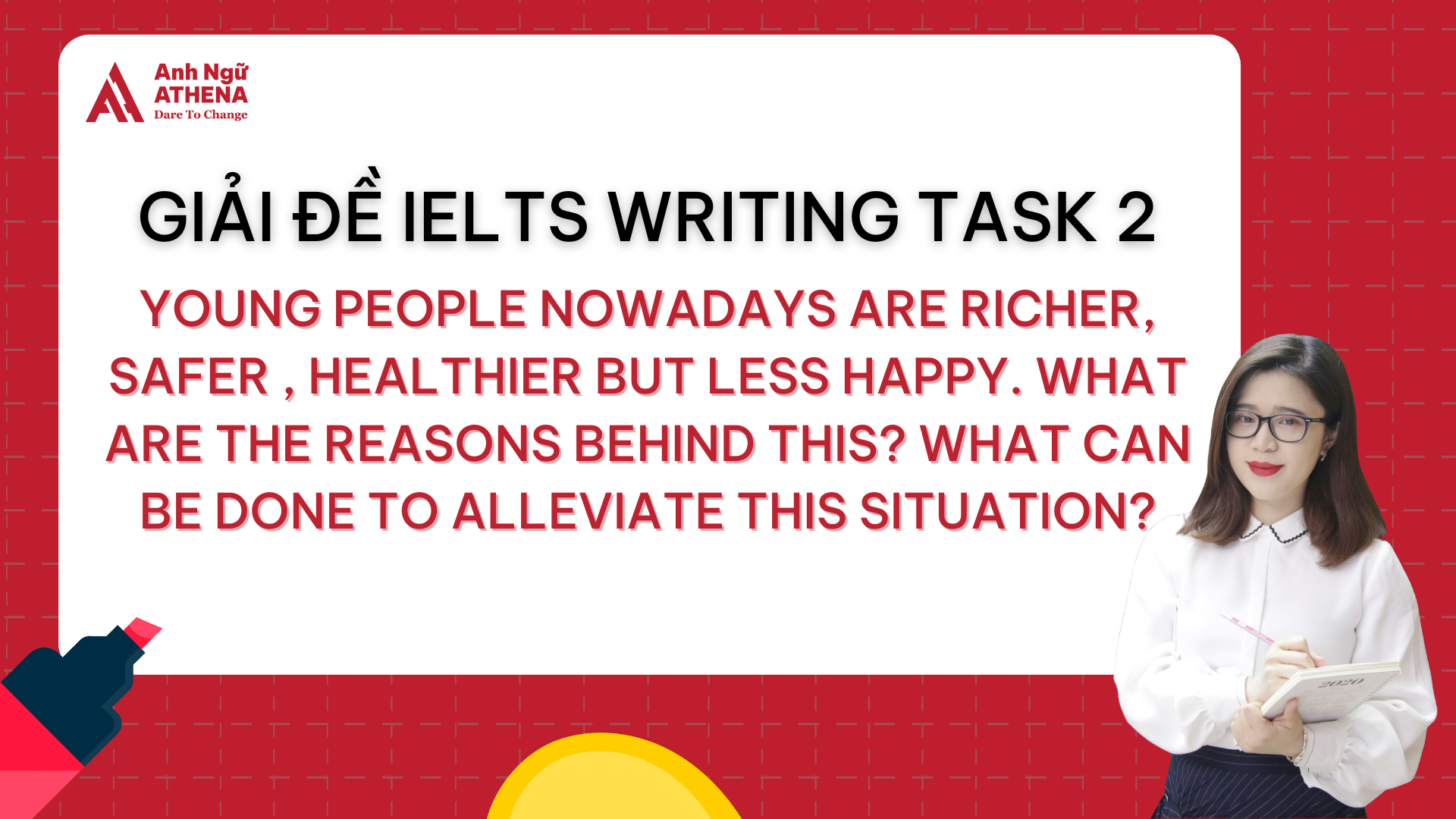Trong IELTS Speaking Part 3, bạn sẽ được hỏi nhiều câu hỏi hơn dựa trên phần IELTS Speaking Part 2. Giám khảo cũng sẽ mong đợi câu trả lời kèm theo lời giải thích và các ví dụ. Vì vậy, bạn cần tìm hiểu kỹ về phần thi này cũng như thực hành nhiều chủ đề. Hãy cùng Anh ngữ Athena tìm hiểu về chiến lược chuẩn bị và trả lời câu hỏi trong IELTS Speaking Part 3, thực chiến cùng 100+ chủ đề mới nhất Quý 1 và 2 năm 2023 (kèm bài mẫu).

Tổng quan về IELTS Speaking Part 3
1.1. IELTS Speaking Part 3 nói trong bao lâu?
IELTS Speaking Part 3 yêu cầu “two-way discussion”, nghĩa là sẽ có sự thảo luận giữa giám khảo và bạn, vì vậy về hình thức sẽ khá giống với IELTS Speaking Part 1. Giám khảo sẽ hỏi bạn một số câu hỏi mang tính chất mở rộng và có liên quan đến chủ đề mà bạn đã trình bày từ Speaking Part 2. Độ dài của phần thi này kéo dài khoảng 4-5 phút.

Tổng quan về IELTS Speaking Part 3
1.2. Tiêu chí chấm điểm của IELTS Speaking Part 3
Cũng như các phần thi khác, IELTS Speaking Part 3 được chấm dựa trên 4 tiêu chí sau đây:
- Fluency and Coherence: Tiêu chuẩn này đánh giá khả năng nói lưu loát và duy trì sự trôi chảy của bạn. Bạn nên cố gắng tránh ngắt quãng lâu hoặc ngập ngừng quá nhiều. Bạn sẽ cần diễn đạt suy nghĩ của mình một cách logic và liên kết các ý tưởng với nhau một cách mạch lạc.
- Lexical Resource:Tiêu chuẩn này đánh giá từ vựng và cách lựa chọn từ của bạn. Bạn nên đặt mục tiêu sử dụng nhiều loại từ vựng, bao gồm cả những từ và cụm từ thông dụng và nâng cao. Điều quan trọng là bạn phải thể hiện khả năng sử dụng từ vựng phù hợp và diễn đạt ý tưởng của mình một cách chính xác.
- Grammatical Range and Accuracy: Tiêu chuẩn này tập trung vào sự hiểu biết và cách sử dụng ngữ pháp của bạn. Bạn nên đặt mục tiêu sử dụng nhiều cấu trúc câu một cách chính xác. Điều này bao gồm việc sử dụng các thì khác nhau, câu điều kiện, câu phức, v.v. Độ chính xác cũng rất quan trọng, vì vậy hãy cố gắng giảm thiểu các lỗi về ngữ pháp và cấu trúc câu.
- Pronunciation: Tiêu chuẩn này đánh giá khả năng phát âm một cách rõ ràng và dễ hiểu của bạn. Mặc dù bạn không cần phải có giọng giống người bản xứ, nhưng bạn phải tập trung phát âm để giám khảo có thể nghe, hiểu được chính xác từ mà bạn muốn nói. Hãy chú ý đến từng âm, trọng âm, ngữ điệu và nhịp điệu để cải thiện cách phát âm của bạn.
4 tiêu chí này được các giám khảo sử dụng để đánh giá khả năng nói của bạn và đã ấn định thang điểm từ 0 đến 9 cho mỗi tiêu chí. Làm quen và luyện tập theo những tiêu chuẩn này có thể giúp bạn cải thiện được những thiếu sót của mình và dễ dàng tạo ấn tượng trong phần thi IELTS Speaking Part 3.

Tiêu chí chấm điểm của IELTS Speaking Part 3
Các dạng câu hỏi trong IELTS Speaking Part 3
| Dạng câu hỏi | Định nghĩa | Ví dụ |
| Opinion-based questions | Những câu hỏi này hỏi ý kiến hoặc quan điểm cá nhân của bạn về một chủ đề cụ thể | Do you think technology has more positive or negative effects on society? |
| Explanation or reason-based questions | Những câu hỏi này yêu cầu bạn đưa ra lời giải thích hoặc lý do đằng sau những hiện tượng hoặc xu hướng nhất định | Why do you think people are increasingly interested in sustainable living? |
| Comparison questions | Những câu hỏi này yêu cầu bạn so sánh các khía cạnh hoặc lựa chọn khác nhau | What are the advantages and disadvantages of studying abroad compared to studying in your home country? |
| Prediction or speculation questions | Những câu hỏi này yêu cầu bạn đưa ra dự đoán hoặc suy đoán về xu hướng hoặc kết quả trong tương lai. | What changes do you think will occur in transportation in the next 20 years? |
| Impact or consequence questions | Những câu hỏi này tập trung vào tác động hoặc hậu quả của một số hành động, tình huống nhất định | What impact does social media have on interpersonal relationships? |
| Problem-solving questions | Những câu hỏi này nhắc bạn đề xuất giải pháp hoặc cách tiếp cận để giải quyết các vấn đề, thách thức cụ thể | How can we encourage more people to adopt environmentally friendly practices? |
| Cultural or societal questions | Những câu hỏi này khám phá các tập quán văn hóa, chuẩn mực xã hội hoặc truyền thống liên quan đến chủ đề này | How does your culture celebrate traditional festivals? |
| Hypothetical questions | Những câu hỏi này yêu cầu bạn tưởng tượng hoặc suy đoán về các tình huống giả định | What would you do if you won a million dollars in a lottery? |
Hướng dẫn chi tiết cách trả lời các dạng câu hỏi IELTS Speaking Part 3
Để trả lời các câu hỏi IELTS Speaking Part 3 một cách trôi chảy, bạn cần biết cách phát triển và sắp xếp ý tưởng của mình.
Một trong các phương pháp nhằm cải thiện đáng kể kỹ năng nói của nhiều sĩ từ, đó chính là mô hình O.R.E.C. Mô hình này giúp bạn có thể sắp xếp suy nghĩ của mình và đưa ra những câu trả lời mạch lạc.
- O: Opinion (Ý kiến): Nêu rõ ý kiến hoặc quan điểm của bạn về chủ đề. Bước này liên quan đến việc thể hiện lập trường cá nhân của bạn về vấn đề này.
- R: Reason (Lý do): Đưa ra những lý do hoặc biện minh hợp lý để hỗ trợ ý kiến của bạn. Giải thích các nguyên tắc, giá trị hoặc bằng chứng cơ bản thể hiện quan điểm của bạn. Bước này giúp thiết lập nền tảng cho lập luận của bạn.
- E: Example (Ví dụ): Minh họa câu trả lời của bạn bằng các ví dụ có liên quan hoặc trường hợp cụ thể. Những ví dụ này nhằm hỗ trợ thêm cho lý luận của bạn và làm cho câu trả lời của bạn trở nên cụ thể và dễ hiểu hơn.
- C: Consequence (Kết quả): Đánh giá và thảo luận về những hậu quả hoặc tác động đến ý kiến của bạn. Bước này cho phép bạn thể hiện sự hiểu biết sâu sắc hơn về chủ đề và tư duy phản biện.

Mô hình O.R.E.C
3.1. Dạng câu hỏi Opinion-based questions - IELTS Speaking Part 3
Các câu hỏi thuộc dạng câu hỏi Opinion-based questions - IELTS Speaking Part 3 yêu cầu thí sinh bày tỏ quan điểm cá nhân về một chủ đề nhất định. Những câu hỏi này nhằm mục đích đánh giá khả năng của bạn trong việc đưa ra những ý kiến có căn cứ và hỗ trợ bạn bằng những ví dụ hoặc giải thích phù hợp.
| Nêu ý kiến của bạn | Bắt đầu bằng cách nêu rõ ý kiến của bạn về chủ đề nhất định. Đảm bảo bày tỏ quan điểm của bạn một cách trực tiếp và chính xác. Ví dụ: "In my opinion..." |
| Cung cấp phần giới thiệu hoặc bối cảnh ngắn gọn | Đưa ra phần giới thiệu hoặc bối cảnh ngắn gọn để tạo tiền đề cho ý kiến của bạn. Điều này có thể giúp giám khảo hiểu rõ hơn quan điểm của bạn và giúp bạn chuyển tiếp suôn sẻ vào phần lập luận. Ví dụ: "From my personal experience/observations, I believe that...." |
| Lý do | Xây dựng các lý do hỗ trợ ý kiến của bạn. Đưa ra những lời giải thích hợp lý và mạch lạc cho lập trường của bạn. Bạn có thể sử dụng các cụm từ như "One main reason is..." hoặc "The primary factor behind my opinion is..." |
| Đưa ra ví dụ hoặc bằng chứng | Hỗ trợ lý luận của bạn bằng các ví dụ hoặc bằng chứng có liên quan. Những điều này có thể được rút ra từ kinh nghiệm cá nhân, quan sát hoặc kiến thức chung. Ví dụ giúp minh họa và củng cố quan điểm của bạn. Sử dụng các cụm từ như "For instance..." hoặc "To give an example..." |
| Thừa nhận các quan điểm thay thế | Giải quyết các lập luận phản biện tiềm ẩn hoặc các quan điểm thay thế để thể hiện cách tiếp cận cân bằng. Bước này cho thấy rằng bạn đã xem xét các quan điểm khác nhau. Bạn có thể sử dụng các cụm từ như "However, some people might argue..." hoặc "On the other hand..." |
| Kết luận | Tóm tắt ý kiến của bạn và các luận điểm chính. Trình bày lại ý kiến của bạn một cách rõ ràng và ngắn gọn. Ví dụ: "In conclusion, I firmly believe that...." |
Ví dụ: Do you think it's important for children to learn a second language? Why or why not?
| Nêu ý kiến của bạn | I think it is essential for children to learn a second language. From my experience, acquiring a second language at a young age has numerous advantages. |
| Lý do | One main reason is that learning a second language enhances cognitive development. Research has shown that bilingual children exhibit improved problem-solving skills and better memory retention. Learning a new language exercises the brain and promotes mental flexibility, positively impacting a child's intellectual abilities. |
| Đưa ra ví dụ hoặc bằng chứng | For example, my niece started learning English at a young age, and I have witnessed how it has benefited her. Not only has she become more adept at switching between two languages, but she has also developed a broader perspective and an appreciation for different cultures. |
| Thừa nhận các quan điểm thay thế | While some may argue that learning a second language may be challenging for children, the benefits far outweigh the difficulties. Exposure to a second language provides children with valuable skills that can open doors to future opportunities. However, some might argue that children should focus solely on their native language to ensure proficiency. On the other hand, in today's interconnected world, being bilingual or multilingual is becoming increasingly valuable. It allows individuals to communicate with a wider range of people and engage in a globalized society. |
| Kết luận | In conclusion, I firmly believe that it is essential for children to learn a second language. The cognitive advantages, broader perspective, and increased opportunities with bilingualism provide long-term benefits that can positively shape a child's future. |
3.2. Dạng câu hỏi Explanation or reason-based questions - IELTS Speaking Part 3
Dạng câu hỏi Explanation or reason-based questions - IELTS Speaking Part 3 yêu cầu thí sinh đưa ra lời giải thích hoặc lý do cho một tình huống hoặc hiện tượng nhất định. Những câu hỏi này nhằm mục đích đánh giá khả năng của bạn trong việc đưa ra những lời giải thích mạch lạc và hợp lý, đồng thời hỗ trợ họ bằng các ví dụ hoặc bằng chứng thích hợp.
| Diễn giải câu hỏi | Bắt đầu bằng cách diễn giải câu hỏi để thể hiện sự hiểu biết của bạn và đưa ra ý kiến khởi đầu rõ ràng cho lời giải thích của bạn. Điều này có thể được thực hiện bằng cách diễn đạt lại câu hỏi bằng cách sử dụng từ ngữ của riêng bạn. |
| Nêu lý do hoặc giải thích | Nêu rõ lý do hoặc lời giải thích để giải quyết câu hỏi. Trình bày quan điểm của bạn hoặc lý do cơ bản góp phần tạo nên hiện tượng hoặc xu hướng đang được thảo luận. Ví dụ: "One key reason for this is..." |
| Giải thích lý do | Cung cấp một lời giải thích chi tiết về lý do của bạn. Chia nó thành các điểm hoặc lý do nhỏ hơn để đảm bảo sự rõ ràng và mạch lạc. Sử dụng ví dụ, bằng chứng hoặc chi tiết hỗ trợ để củng cố lời giải thích của bạn. Bạn có thể sử dụng các cụm từ như "To elaborate further..." hoặc "This can be attributed to..." |
| Cho ví dụ cụ thể | Hỗ trợ lời giải thích của bạn bằng các ví dụ hoặc trường hợp cụ thể minh họa lý do bạn đưa ra. Những ví dụ này phải phù hợp, cụ thể và thể hiện hiệu quả việc áp dụng lý do vào các tình huống thực tế. Sử dụng các cụm từ như "For example..." hoặc "To give a specific example..." |
| Kết nối với bối cảnh rộng hơn | Kết nối lời giải thích của bạn với bối cảnh hoặc ý nghĩa rộng hơn của hiện tượng hoặc xu hướng đang được thảo luận. Xem xét hậu quả, tác động hoặc mức độ liên quan của lời giải thích của bạn trong bối cảnh rộng hơn. Sử dụng các cụm từ như "This has significant implications for..." hoặc "This trend can be seen in various aspects of..." |
| Kết luận | Tóm tắt lời giải thích của bạn và các luận điểm chính. Trình bày lại lý do bạn đưa ra và nhấn mạnh tầm quan trọng của nó trong việc tìm hiểu hiện tượng hoặc xu hướng. Ví dụ: "In conclusion, the reason behind... is..." |
Ví dụ: Why do some people prefer to work from home instead of going to the office?
| Diễn giải câu hỏi | When it comes to the choice between working remotely and going to a physical workplace, what are the reasons behind some individuals favoring the option of working from home? |
| Nêu lý do hoặc giải thích | One key reason for this is the increasing availability and advancements in technology that enable remote work. |
| Giải thích lý do | To elaborate further, the digital age has brought about significant changes in communication and connectivity. With the advent of high-speed internet, video conferencing tools, and collaborative platforms, individuals can accomplish their work tasks efficiently from the comfort of their own homes. This can be attributed to the convenience and flexibility that remote work offers. |
| Cho ví dụ cụ thể | For instance, communication tools such as Zoom, Microsoft Teams, and Slack allow employees to connect with colleagues and clients seamlessly, regardless of their physical location. This technology facilitates real-time collaboration, file sharing, and instant messaging, replicating many aspects of face-to-face interactions in a virtual environment. Additionally, cloud-based storage and project management platforms enable remote teams to access and work on shared documents and assignments. |
| Kết nối với bối cảnh rộng hơn | This trend of preferring remote work has significant implications for work-life balance and productivity. By eliminating the need for daily commutes, individuals can save time, reduce stress, and have more flexibility in managing their schedules. Moreover, working remotely can result in cost savings for both employees and employers, such as reduced transportation expenses and office overhead costs. |
| Kết luận | In conclusion, the reason behind the preference for working from home instead of going to the office is closely tied to technological advancements that enable remote work. This option's convenience, flexibility, and cost-saving benefits have made it an attractive choice for many individuals seeking a better work-life balance and increased productivity. |
3.3. Dạng câu hỏi Comparison questions - IELTS Speaking Part 3
Dạng câu hỏi Comparison questions - IELTS Speaking Part 3 yêu cầu thí sinh so sánh và đối chiếu các khía cạnh hoặc lựa chọn khác nhau liên quan đến một chủ đề nhất định. Những câu hỏi này nhằm đánh giá khả năng phân tích, đánh giá thông tin, so sánh và bày tỏ sở thích hoặc ý kiến của bạn dựa trên sự so sánh.
| Diễn giải câu hỏi | Bắt đầu bằng cách diễn giải câu hỏi để thể hiện sự hiểu biết của bạn và cung cấp điểm khởi đầu rõ ràng cho sự so sánh của bạn. Điều này có thể được thực hiện bằng cách diễn đạt lại câu hỏi bằng cách sử dụng từ ngữ của riêng bạn. |
| Xác định điểm so sánh | Xác định rõ ràng các khía cạnh hoặc đặc điểm cụ thể mà bạn sẽ so sánh. Đây có thể là những điểm tương đồng, khác biệt, ưu điểm, nhược điểm hoặc bất kỳ điểm so sánh có liên quan nào khác. |
| Trình bày điểm so sánh đầu tiên | Giới thiệu điểm so sánh đầu tiên và đưa ra lời giải thích hoặc mô tả ngắn gọn về nó. Nêu rõ đó là sự giống nhau hay khác biệt giữa hai ý tưởng, khái niệm hoặc tình huống đó. |
| Hỗ trợ quan điểm đầu tiên bằng các ví dụ hoặc bằng chứng | Cung cấp ví dụ, bằng chứng hoặc chi tiết hỗ trợ minh họa điểm so sánh đầu tiên. Những ví dụ này phải phù hợp và thể hiện một cách hiệu quả những điểm tương đồng hoặc khác biệt mà bạn đã đề cập. |
| Trình bày điểm so sánh thứ hai | Giới thiệu điểm so sánh thứ hai và đưa ra lời giải thích hoặc mô tả ngắn gọn về nó. Nêu rõ đó là sự giống nhau hay khác biệt giữa hai ý tưởng, khái niệm hoặc tình huống đó. |
| Hỗ trợ quan điểm thứ hai bằng các ví dụ hoặc bằng chứng | Cung cấp ví dụ, bằng chứng hoặc chi tiết hỗ trợ minh họa điểm so sánh thứ hai. Những ví dụ này phải phù hợp và thể hiện một cách hiệu quả những điểm tương đồng hoặc khác biệt mà bạn đã đề cập. |
| Kết luận | Tóm tắt sự so sánh của bạn bằng cách nêu bật những điểm tương đồng và khác biệt chính giữa các ý tưởng, khái niệm hoặc tình huống mà bạn đã thảo luận. Đưa ra một kết luận hoặc nhận xét ngắn gọn nhấn mạnh tầm quan trọng hoặc hàm ý của sự so sánh. |
Ví dụ: Compare the advantages and disadvantages of traditional classroom learning and online education.
| Diễn giải câu hỏi | When considering the benefits and drawbacks of traditional face-to-face learning in a classroom setting and online education, what are the points of comparison? |
| Xác định điểm so sánh | We will examine their advantages and disadvantages in comparing traditional classroom learning and online education. |
| Trình bày điểm so sánh đầu tiên | One advantage of traditional classroom learning is the immediate interaction and engagement between students and teachers. In a physical classroom, students can ask questions, participate in discussions, and receive instant feedback, fostering a dynamic learning environment. |
| Hỗ trợ quan điểm đầu tiên bằng các ví dụ hoặc bằng chứng | For example, during class discussions, students can gain different perspectives from their peers and engage in lively debates, enhancing their critical thinking and communication skills. Additionally, face-to-face interaction allows teachers to assess students' understanding and provide personalized guidance based on their needs. |
| Trình bày điểm so sánh thứ hai | On the other hand, online education offers flexibility and convenience. With online courses, students can learn at their own pace and schedule. They can access learning materials anytime and anywhere, making education more accessible for those with busy lifestyles or geographical constraints. |
| Hỗ trợ quan điểm thứ hai bằng các ví dụ hoặc bằng chứng | For instance, working professionals or individuals with family commitments can pursue further education without compromising their responsibilities. Online platforms also often provide various resources, including multimedia materials and interactive exercises, to cater to different learning styles and preferences. |
| Kết luận | In conclusion, traditional classroom learning excels in immediate interaction and engagement, allowing for dynamic discussions and personalized feedback. On the other hand, online education offers flexibility and convenience, accommodating diverse schedules and providing accessible learning resources. Ultimately, the choice between these two approaches depends on individual preferences, learning styles, and the specific goals of the learners. |
3.4. Dạng câu hỏi Prediction or speculation questions - IELTS Speaking Part 3
Dạng câu hỏi Prediction or speculation questions - IELTS Speaking Part 3 yêu cầu thí sinh đưa ra dự đoán hoặc suy đoán về kết quả hoặc khả năng trong tương lai dựa trên một tình huống hoặc chủ đề nhất định. Những câu hỏi này đánh giá khả năng suy nghĩ của bạn, đưa ra các giả định hợp lý và bày tỏ suy nghĩ của bạn về các tình huống giả định.
| Diễn giải câu hỏi | Bắt đầu bằng cách diễn giải câu hỏi để thể hiện sự hiểu biết của bạn và cung cấp điểm khởi đầu rõ ràng cho những dự đoán hoặc suy đoán của bạn. Điều này có thể được thực hiện bằng cách diễn đạt lại câu hỏi bằng cách sử dụng từ ngữ của riêng bạn. |
| Giới thiệu chủ đề | Cung cấp một giới thiệu ngắn gọn về chủ đề và bối cảnh của câu hỏi. Tạo tiền đề cho những dự đoán hoặc suy đoán của bạn bằng cách tóm tắt tình hình hiện tại hoặc các xu hướng liên quan đến chủ đề. |
| Trình bày dự đoán/suy đoán đầu tiên | Nêu dự đoán hoặc suy đoán đầu tiên của bạn về kết quả tiềm năng trong tương lai hoặc sự phát triển liên quan đến chủ đề này. Giải thích rõ ràng lý do đằng sau dự đoán/suy đoán của bạn. |
| Hỗ trợ dự đoán đầu tiên bằng lý do hoặc bằng chứng | Đưa ra lý do, bằng chứng hoặc chi tiết hỗ trợ để biện minh cho dự đoán hoặc suy đoán đầu tiên của bạn. Sử dụng các lập luận, ví dụ hoặc dữ liệu hợp lý để củng cố quan điểm của bạn. |
| Trình bày dự đoán/suy đoán thứ hai | Hỗ trợ dự đoán thứ hai bằng lý do hoặc bằng chứng |
| Hỗ trợ dự đoán thứ hai bằng lý do hoặc bằng chứng | Đưa ra lý do, bằng chứng hoặc chi tiết hỗ trợ để biện minh cho dự đoán hoặc suy đoán thứ hai của bạn. Sử dụng các lập luận, ví dụ hoặc dữ liệu hợp lý để củng cố quan điểm của bạn. |
| Thảo luận về những tác động hoặc hậu quả tiềm ẩn | Khám phá những hàm ý, hậu quả hoặc tác động tiềm ẩn của những dự đoán hoặc suy đoán mà bạn đã trình bày. Thảo luận xem những kết quả này có thể ảnh hưởng như thế nào đến cá nhân, xã hội hoặc chủ đề đang được thảo luận. |
| Kết luận | Tóm tắt những dự đoán hoặc suy đoán của bạn và nêu lại tầm quan trọng của chúng trong việc hiểu được những phát triển tiềm năng trong tương lai liên quan đến chủ đề này. Đưa ra một kết luận hoặc nhận xét ngắn gọn làm nổi bật tầm quan trọng của việc xem xét những khả năng này. |
Ví dụ: What do you think will be the future impact of artificial intelligence on the job market?
| Diễn giải câu hỏi | When considering the potential effects of artificial intelligence on the job market in the coming years, what are your predictions or speculations? |
| Giới thiệu chủ đề | Artificial intelligence (AI) has been rapidly advancing and transforming various industries. Currently, it is being integrated into different aspects of our lives, including the workplace. However, its future impact on the job market remains a topic of discussion and speculation. |
| Trình bày dự đoán/suy đoán đầu tiên | Firstly, I predict that AI will lead to the automation of certain repetitive tasks and job roles. AI systems can handle routine and predictable tasks more efficiently and accurately than humans as they become more sophisticated and capable. This may result in a reduction in the demand for jobs that involve repetitive manual or cognitive labor. |
| Hỗ trợ dự đoán đầu tiên bằng lý do hoặc bằng chứng | For example, in manufacturing, customer service, and data entry industries, AI-powered systems can perform tasks such as assembly line operations, chatbot interactions, and data analysis more quickly and consistently. This could lead to job displacements in these areas, requiring individuals to upskill or transition to new roles requiring creativity, critical thinking, and complex problem-solving. |
| Trình bày dự đoán/suy đoán thứ hai | On the other hand, I speculate that AI will also create new job opportunities and roles centered around developing, maintaining, and managing AI systems. As AI technology advances, there will be a growing need for individuals with expertise in AI programming, data analysis, algorithm design, and ethical considerations related to AI implementation. |
| Hỗ trợ dự đoán thứ hai bằng lý do hoặc bằng chứng | For instance, companies and organizations will require AI specialists to develop and customize AI algorithms, ensure the ethical use of AI, and address potential biases or risks associated with AI systems. Additionally, AI will create demand for roles related to interpreting and making strategic decisions based on AI-generated insights. |
| Thảo luận về những tác động hoặc hậu quả tiềm ẩn | The implications of these predictions are significant. While some job roles may be replaced by AI automation, the emergence of new AI-related parts emphasizes the importance of upskilling and adaptability in the workforce. It will be crucial for individuals to acquire skills that complement AI technology and enable them to work alongside these systems effectively. |
| Kết luận | In summary, the future impact of artificial intelligence on the job market will likely involve a combination of job displacements through automation and the creation of new AI-related roles. Adapting to these changes will require individuals to continually develop their skills and remain flexible in response to evolving job market demands. |
3.5. Dạng câu hỏi Impact or consequence questions - IELTS Speaking Part 3
Dạng câu hỏi Impact or consequence questions - IELTS Speaking Part 3 yêu cầu thí sinh thảo luận về tác động hoặc hậu quả của một tình huống, hành động hoặc xu hướng nhất định. Những câu hỏi này đánh giá khả năng của bạn trong việc phân tích mối quan hệ nhân quả, xác định các tác động tiềm ẩn và bày tỏ suy nghĩ của họ về ý nghĩa rộng hơn của một chủ đề.
| Diễn giải câu hỏi | Bắt đầu bằng cách diễn giải câu hỏi để thể hiện sự hiểu biết của bạn và đưa ra điểm khởi đầu rõ ràng để thảo luận về tác động hoặc hậu quả. Điều này có thể được thực hiện bằng cách diễn đạt lại câu hỏi bằng cách sử dụng từ ngữ của riêng bạn. |
| Giới thiệu chủ đề và bối cảnh | Cung cấp một giới thiệu ngắn gọn về chủ đề hoặc tình huống đang được thảo luận. Đặt giai đoạn bằng cách tóm tắt bối cảnh hoặc bối cảnh cần thiết để hiểu tác động hoặc hậu quả. |
| Xác định tác động hoặc hậu quả cụ thể | Nêu rõ tác động hoặc hậu quả cụ thể mà bạn sẽ thảo luận. Đây có thể là tác động tích cực hoặc tiêu cực, kết quả ngắn hạn hoặc dài hạn hoặc bất kỳ tác động hoặc hậu quả liên quan nào khác. |
| Trình bày điểm tác động hoặc hậu quả đầu tiên | Giới thiệu điểm tác động hoặc hậu quả đầu tiên và đưa ra lời giải thích hoặc mô tả ngắn gọn về nó. Nêu rõ mối quan hệ nhân quả giữa tình huống đó với tác động hoặc hậu quả. |
| Hỗ trợ quan điểm đầu tiên bằng các ví dụ hoặc bằng chứng | Cung cấp ví dụ, bằng chứng hoặc chi tiết hỗ trợ minh họa điểm tác động hoặc hậu quả đầu tiên. Những ví dụ này phải phù hợp và thể hiện một cách hiệu quả mối quan hệ nhân quả mà bạn đã đề cập. |
| Trình bày điểm tác động hoặc hậu quả thứ hai | Giới thiệu điểm tác động hoặc hậu quả thứ hai và đưa ra lời giải thích hoặc mô tả ngắn gọn về nó. Nêu rõ mối quan hệ nhân quả giữa tình huống đó với tác động hoặc hậu quả. |
| Hỗ trợ quan điểm thứ hai bằng các ví dụ hoặc bằng chứng | Cung cấp ví dụ, bằng chứng hoặc chi tiết hỗ trợ minh họa điểm tác động hoặc hậu quả thứ hai. Những ví dụ này phải phù hợp và thể hiện một cách hiệu quả mối quan hệ nhân quả mà bạn đã đề cập. |
| Thảo luận về ý nghĩa hoặc tầm quan trọng tiềm năng | Khám phá những tác động, tầm quan trọng hoặc tầm quan trọng tiềm ẩn của những tác động hoặc hậu quả mà bạn đã thảo luận. Thảo luận xem chúng có thể ảnh hưởng như thế nào đến cá nhân, cộng đồng hoặc bối cảnh rộng hơn của chủ đề đang được thảo luận. |
| Kết luận | Tóm tắt những tác động hoặc hậu quả mà bạn đã thảo luận và trình bày lại tầm quan trọng của chúng trong việc tìm hiểu tình huống hoặc sự kiện. Đưa ra một kết luận hoặc nhận xét ngắn gọn làm nổi bật tầm quan trọng của việc xem xét những tác động hoặc kết quả này. |
Ví dụ: What are the environmental consequences of deforestation?
| Diễn giải câu hỏi | When considering the effects or results of deforestation on the environment, what are the impacts or consequences? |
| Giới thiệu chủ đề và bối cảnh | One of the primary environmental consequences of deforestation is the loss of biodiversity. |
| Xác định tác động hoặc hậu quả cụ thể | One of the primary environmental consequences of deforestation is the loss of biodiversity. |
| Trình bày điểm tác động hoặc hậu quả đầu tiên | Deforestation leads to the destruction and fragmentation of natural habitats, resulting in the loss of numerous plant and animal species. As forests are cleared, the diverse ecosystems they support are disrupted, leading to the displacement and extinction of many species. |
| Hỗ trợ quan điểm đầu tiên bằng các ví dụ hoặc bằng chứng | For instance, tropical rainforests, known for their incredible biodiversity, are being cleared at an alarming rate. This deforestation directly threatens species like orangutans, tigers, and various bird species, pushing them closer to extinction. Additionally, the loss of forest cover reduces the available habitat for countless plant species, further impacting the delicate balance of ecosystems. |
| Trình bày điểm tác động hoặc hậu quả thứ hai | Another significant consequence of deforestation is the disruption of the water cycle and increased soil erosion. |
| Hỗ trợ quan điểm thứ hai bằng các ví dụ hoặc bằng chứng | Forests play a crucial role in regulating water flow and maintaining soil stability. The removal of trees disrupts this natural process, leading to increased runoff, reduced groundwater recharge, and heightened risks of floods and droughts in affected areas. Moreover, without the protection of tree roots, soil erosion intensifies, resulting in the loss of fertile topsoil, which negatively impacts agriculture and contributes to sedimentation in rivers and streams. |
| Thảo luận về ý nghĩa hoặc tầm quan trọng tiềm năng | The consequences of deforestation have far-reaching implications. Loss of biodiversity threatens the delicate balance of ecosystems, affecting the overall health and resilience of the planet. The disruption of the water cycle and soil erosion can lead to environmental degradation, reduced agricultural productivity, and increased vulnerability to natural disasters. Furthermore, deforestation contributes to climate change by releasing significant amounts of carbon dioxide into the atmosphere. |
| Kết luận | In summary, deforestation has severe environmental consequences. The loss of biodiversity, disrupted water cycle, soil erosion, and contributions to climate change are significant impacts that underscore the urgency of addressing deforestation and promoting sustainable land management practices. Protecting and restoring forests are crucial in mitigating these consequences and ensuring the long-term health and sustainability of our planet. |
3.6. Dạng câu hỏi Problem-solving questions
Dạng câu hỏi Problem-solving questions yêu cầu thí sinh phân tích một vấn đề hoặc tình huống nhất định và đề xuất các giải pháp hoặc chiến lược tiềm năng. Những câu hỏi này đánh giá khả năng tư duy phản biện của bạn, xác định các vấn đề tiềm ẩn và đưa ra các giải pháp thực tế.
| Diễn giải câu hỏi | Bắt đầu bằng cách diễn giải câu hỏi để thể hiện sự hiểu biết của bạn và đưa ra điểm khởi đầu rõ ràng để thảo luận về vấn đề cũng như các giải pháp tiềm năng. Điều này có thể được thực hiện bằng cách diễn đạt lại câu hỏi bằng cách sử dụng từ ngữ của riêng bạn. |
| Xác định rõ vấn đề | Nêu rõ vấn đề hoặc vấn đề cần giải quyết. Cung cấp mô tả ngắn gọn về vấn đề, bao gồm các khía cạnh hoặc yếu tố chính của nó. |
| Trình bày giải pháp hoặc chiến lược tiềm năng đầu tiên | Giới thiệu giải pháp đầu tiên có thể giúp giải quyết vấn đề. Giải thích rõ ràng giải pháp này đòi hỏi những gì và nó có thể góp phần giải quyết vấn đề như thế nào. |
| Hỗ trợ giải pháp đầu tiên bằng lý do hoặc bằng chứng | Cung cấp lý do, bằng chứng hoặc chi tiết hỗ trợ để chứng minh tính hiệu quả hoặc tính khả thi của giải pháp. Sử dụng các lập luận, ví dụ hoặc dữ liệu hợp lý để củng cố quan điểm của bạn. |
| Trình bày giải pháp hoặc chiến lược tiềm năng thứ hai | Giới thiệu giải pháp thứ hai có thể giúp giải quyết vấn đề. Giải thích rõ ràng giải pháp này đòi hỏi những gì và nó có thể góp phần giải quyết vấn đề như thế nào. |
| Hỗ trợ giải pháp thứ hai bằng lý do hoặc bằng chứng | Cung cấp lý do, bằng chứng hoặc chi tiết hỗ trợ để chứng minh tính hiệu quả hoặc tính khả thi của giải pháp hoặc chiến lược thứ hai. Sử dụng các lập luận, ví dụ hoặc dữ liệu hợp lý để củng cố quan điểm của bạn. |
| Thảo luận về những tác động hoặc cân nhắc tiềm ẩn | Khám phá những tác động hoặc những điểm cần cân nhắc khi thực hiện các giải pháp được đề xuất. Thảo luận về mọi thách thức, hạn chế hoặc sự đánh đổi có thể phát sinh từ việc thực hiện chúng. |
| Kết luận | Tóm tắt các giải pháp mà bạn đã trình bày và nêu lại tầm quan trọng của chúng trong việc giải quyết vấn đề. Đưa ra một kết luận hoặc nhận xét ngắn gọn làm nổi bật tầm quan trọng của việc xem xét nhiều cách tiếp cận khi giải quyết vấn đề. |
Ví dụ: What measures can be taken to reduce traffic congestion in cities?
| Diễn giải câu hỏi | When considering ways to alleviate traffic congestion in urban areas, what measures or strategies can be implemented? |
| Xác định rõ vấn đề | Traffic congestion in cities has become a significant issue, leading to increased travel times, environmental pollution, and decreased overall efficiency of transportation systems. |
| Trình bày giải pháp hoặc chiến lược tiềm năng đầu tiên | One potential measure to reduce traffic congestion is to improve public transportation infrastructure and services. |
| Hỗ trợ giải pháp đầu tiên bằng lý do hoặc bằng chứng | By investing in reliable and efficient public transportation systems, more people may be encouraged to switch from private vehicles to public modes of transport. This could help reduce the number of cars on the road, easing congestion. Additionally, the availability of well-connected and affordable public transportation options can provide a viable alternative for commuters, reducing the need for individual car usage. |
| Trình bày giải pháp hoặc chiến lược tiềm năng thứ hai | Another measure to address traffic congestion is to promote active transportation, such as walking and cycling. |
| Hỗ trợ giải pháp thứ hai bằng lý do hoặc bằng chứng | By creating pedestrian-friendly infrastructure, such as sidewalks and bike lanes, and implementing policies that prioritize the safety and convenience of pedestrians and cyclists, more people may choose to walk or cycle for shorter journeys. This not only reduces the number of vehicles on the road but also promotes physical activity and reduces environmental pollution. |
| Thảo luận về những tác động hoặc cân nhắc tiềm ẩn | While improving public transportation and promoting active transportation can be effective strategies, their successful implementation may require careful planning and consideration. Factors such as funding, infrastructure development, and public awareness campaigns would need to be addressed. Additionally, city planners and policymakers should take into account the specific needs and characteristics of each city to tailor the solutions accordingly. |
| Kết luận | In summary, reducing traffic congestion in cities requires a multi-faceted approach. Improving public transportation infrastructure and promoting active transportation can contribute significantly to alleviating congestion and improving the overall quality of urban life. However, the successful implementation of these measures would require careful planning, adequate funding, and active participation from both policymakers and the public. |
3.7. Dạng câu hỏi Cultural or societal questions - IELTS Speaking Part 3
Dạng câu hỏi Cultural or societal questions - IELTS Speaking Part 3 yêu cầu thí sinh thảo luận về các khía cạnh khác nhau của văn hóa, xã hội hoặc các vấn đề xã hội. Những câu hỏi này nhằm đánh giá sự hiểu biết của ứng viên về các chuẩn mực văn hóa, động lực xã h


![Hướng dẫn chi tiết cách trả lời dạng bài IELTS Speaking Part 2 Describe a place [kèm bài mẫu tham khảo]](https://anhnguathena.vn/anhngu//img.media/2023/09/1695297392777.png?v=1.0.0)











![[Cập nhật] Lịch thi TOEIC 2025 Quý 1 tại IIG Việt Nam](https://anhnguathena.vn/upload/ban-sao-cua-template-bai-viet-seo-6.png?v=1.0.0)





